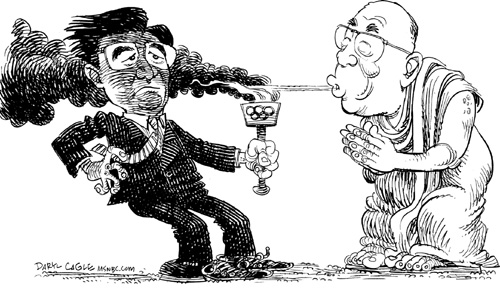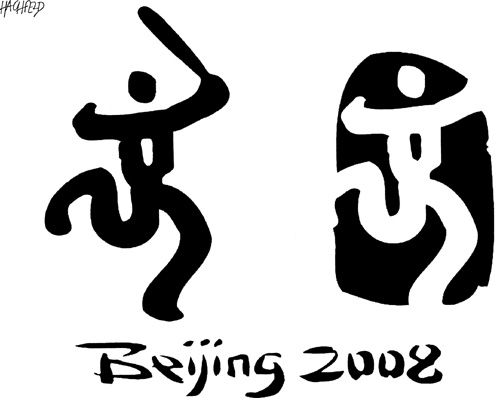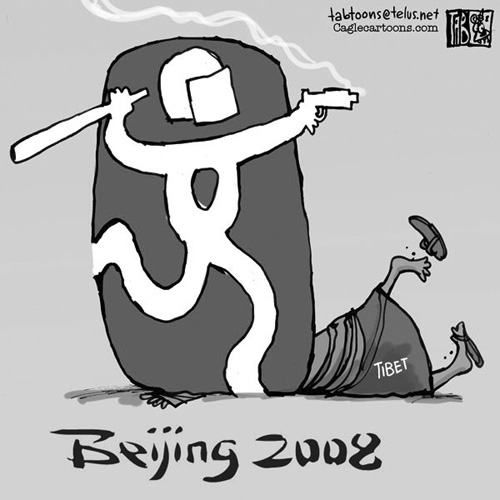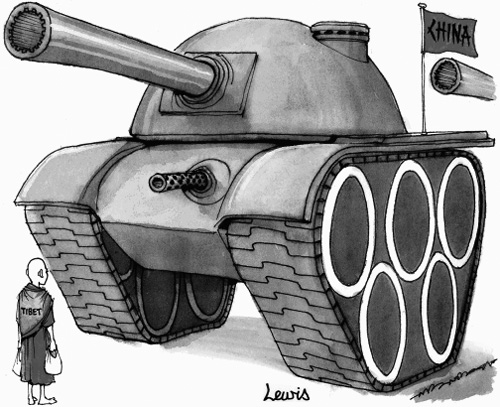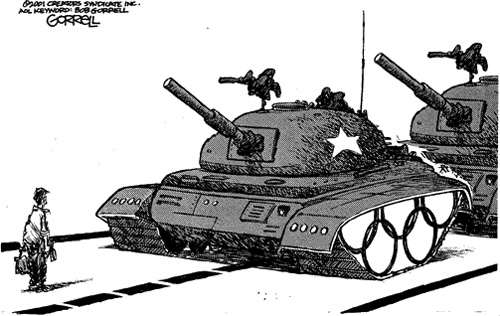China hosted the Olympics in 2008 and news from China was in the headlines all year long, with a massive earthquake in Szechwan province, Olympic torch relay protests against Chinese rule in Tibet, and a scandal about milk tainted with industrial melamine.
I went on a speaking tour in China as part of a cultural exchange through the U.S. State Department, talking to college audiences about my political cartoons and what it’s like to be an editorial cartoonist in America. I was there just before the Olympics, at the time of the earthquake. I had an opportunity to meet with lots of Chinese cartoonists, to learn about the cartooning profession there, and to meet lots of eager, interesting college audiences.
The best measures of political freedom in any country are their political cartoons and whether cartoonists are allowed to draw their own leaders. Chinese cartoonists almost never draw their leaders, and my Bush-bashing cartoons were very foreign to Chinese audiences, who seemed genuinely concerned for my safety; they thought I was in danger from the politicians I lampooned in America. The questions were the same, wherever I went:
On one stop in China I gave a speech to a college class at an American Consulate and, unlike my other speeches in China, I showed some cartoons about China. At the time of my visit, Chinese passions were running high against worldwide protests of the Olympic torch relay, protesting China’s rule of Tibet. I showed a series of cartoons criticizing China with the Olympic logo, from countries around the world. The audience gasped in horror, having never seen anything like these cartoons – then they laughed; after all, these are just cartoons. Here they are, below and on the next pages.
Now that you have visited China, and have learned more about China, will you be drawing cartoons that support China? | |
Probably not. |
The students asked whether I was excited about the Olympics (no, I wasn’t) and what I thought about the earthquake (it was terrible, but I wish President Bush had responded to Hurricane Katrina as quickly as the Chinese government responded to the earthquake).
I learned what the Chinese think are funny — pigs and homosexuals. If I ever give a speech in China again, I’ll be sure to show all of my cartoons that feature pigs and homosexuals.
On all but one occasion, I didn’t show cartoons about China. I just wanted to show how I draw disrespectful cartoons about American leaders. That was enough to shock these audiences and show how different our press freedoms are. I was always asked how China is depicted in cartoons, and I answered that there are four symbols of China in international editorial cartoons: a panda bear, a Chinese dragon, the Great Wall, or the guy standing in front of the tank in Tiananmen Square — the audience gasps — many of the students have never seen the famous photo, and the subject of the Tiananmen Square “incident” is rarely discussed. At one speech, I mentioned the four symbols, the audience gasped, and one student jumped up, saying, “Oh! Oh! What kind of dragon?!”
I explained to the college kids about “censorship” in America, and that the government never censors cartoonists, but that freedom of the press belongs to the guy who owns the press and cartoonists often complain about their editors. This seemed to be a difficult distinction for them to grasp, in a country where the government owns or controls the press.
The Chinese have embraced capitalism; the country is booming, but the Chinese are eager to prove that economic freedom and political freedom are separate matters that don’t go together. The willingness of the Chinese to accept the restrictions on their press is shocking to my American sensibilities — just as my cartoons were shocking to the Chinese.
– Daryl Cagle

